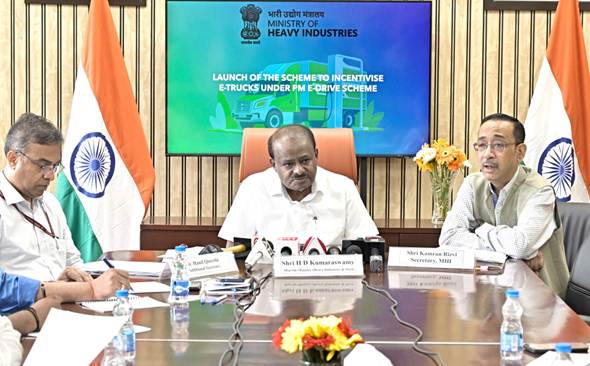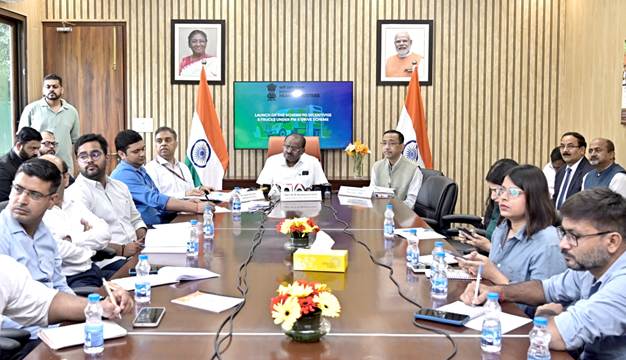Ministry of Heavy Industries
India Rolls Out First-Ever e-Truck Incentive Scheme Under PM Modi’s Green Mobility Vision
HD Kumaraswamy Launches Game-Changing e-Truck Scheme to Cut Freight Emissions and Boost Make in India
GoI Unveils ₹9.6 Lakh Incentive for Electric Trucks to Power Net-Zero Freight Transition
5,600 e-Trucks, Cleaner Cities: PM E-DRIVE Accelerates India’s Green Freight Revolution
Posted On:
11 JUL 2025 2:57PM by PIB Delhi
Under the visionary leadership of Prime Minister Shri Narendra Modi and the guidance of Union Minister for Heavy Industries & Steel, Shri H.D. Kumaraswamy, the Ministry of Heavy Industries (MHI), Government of India, has launched a groundbreaking scheme to provide financial incentives for electric trucks (e-trucks) under the PM E-DRIVE initiative. This marks the first time the Government of India is extending direct support for electric trucks, aiming to accelerate the country’s transition to clean, efficient, and sustainable freight mobility.

Highlighting the significance of the scheme, Union Minister Shri H.D. Kumaraswamy stated, “Diesel trucks, though constituting only 3% of the total vehicle population, contribute to 42% of transport-related greenhouse gas emissions and significantly worsen air pollution. This pioneering scheme, guided by the visionary leadership of Prime Minister Shri Narendra Modi, represents India’s first dedicated support for electric trucks. It will drive our nation toward sustainable freight mobility, a cleaner future, and the realization of Viksit Bharat by 2047, in alignment with our net-zero emissions goal by 2070.”
Under the scheme, demand incentives will be extended to N2 and N3 category electric trucks, as defined under the Central Motor Vehicle Rules (CMVR).
- The N2 category includes trucks with a Gross Vehicle Weight (GVW) above 3.5 tonnes and up to 12 tonnes.
- The N3 category covers trucks with GVW exceeding 12 tonnes and up to 55 tonnes. In the case of articulated vehicles, incentives will apply only to the puller tractor of the N3 category.
To ensure reliability and performance, the scheme mandates comprehensive manufacturer-backed warranties.
- The battery must be covered under a warranty for five years or 5 lakh kilometres, whichever is earlier.
- The vehicle and motor must have a warranty of five years or 2.5 lakh kilometres, whichever is earlier.
To promote affordability, the incentive amount will depend on the GVW of the electric truck, with the maximum incentive set at ₹9.6 lakh per vehicle. These incentives will be offered as an upfront reduction in the purchase price and reimbursed to OEMs via the PM E-DRIVE portal on a first-come, first-served basis.
The scheme is expected to support the deployment of approximately 5,600 e-trucks across the country. A dedicated provision for 1,100 e-trucks registered in Delhi has been made, with an estimated outlay of ₹100 crore, aimed at addressing the capital’s serious air quality challenges.
Key sectors set to benefit include the cement industry, ports, steel, and the logistics sector. Several leading OEMssuch as Volvo Eicher, Tata Motors, and Ashok Leylandare already engaged in manufacturing electric trucks in India, enhancing indigenous capabilities under the Atmanirbhar Bharat vision.

The initiative has received a warm response from both manufacturers and users of e-trucks, who acknowledge the scheme’s potential to lower logistics costs and reduce carbon emissions.
As a strong show of CPSE leadership, the Steel Authority of India Limited (SAIL) has committed to procure 150 e-trucks over the next two years for deployment across multiple locations. Additionally, SAIL has set an internal target to ensure that at least 15% of all vehicles hired across its units are electric.
To qualify for the incentives, the scrapping of old, polluting trucks is mandatoryensuring a dual benefit of modernising vehicle fleets and reducing emissions.
This forward-looking initiative by the Ministry of Heavy Industries aligns with the Government of India’s broader objective of building a self-reliant electric mobility ecosystem. By extending incentives to e-trucks, the scheme aims to reduce operational costs for transporters, encourage clean energy adoption in the heavy vehicle segment, and enhance air quality in urban and industrial regionsbringing India closer to a sustainable, low-carbon future.
****
TPJ/NJ
(Release ID: 2143995)
Visitor Counter : 1630